Nursing Assignment: Social Media Trolling and Adolescent Well-being
VerifiedAdded on 2023/04/23
|6
|1067
|311
Essay
AI Summary
This nursing essay examines the impact of social media trolling on adolescent well-being, highlighting the vulnerability of teenagers to external stressors in the digital age. It discusses the prevalence of mental health conditions among teenagers and the significant influence of social media on their emotional and behavioral development. The essay outlines assessment strategies, including interviews and mental health evaluations, to understand the effects of trolling on adolescents, emphasizing the importance of ethical considerations such as patient autonomy and confidentiality. It also proposes support strategies, such as increased physical activity and counseling, to help teenagers cope with the negative effects of social media trolling and improve their overall mental health and social connections. The essay concludes by underscoring the need for comprehensive support systems to address the challenges faced by adolescents in the digital age.
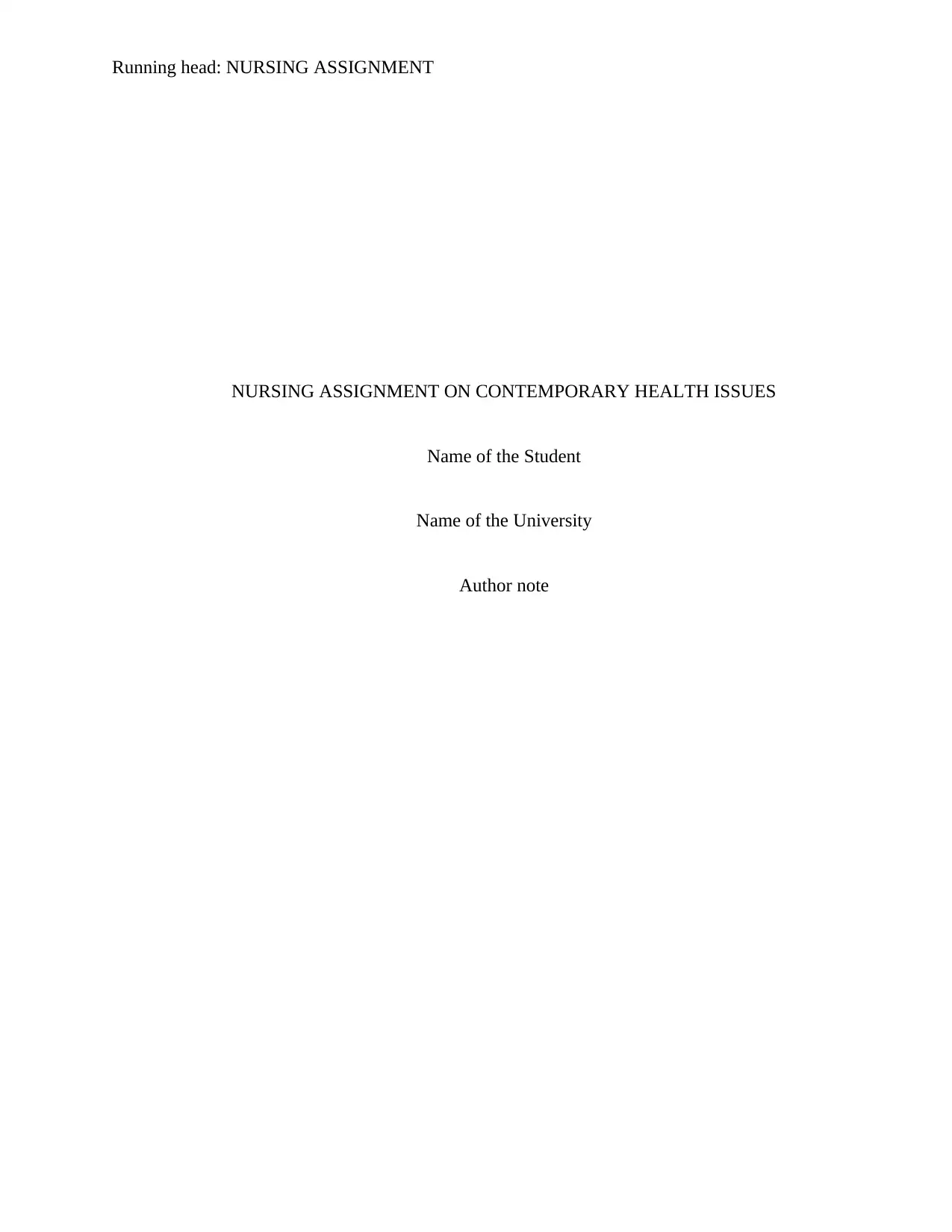
Running head: NURSING ASSIGNMENT
NURSING ASSIGNMENT ON CONTEMPORARY HEALTH ISSUES
Name of the Student
Name of the University
Author note
NURSING ASSIGNMENT ON CONTEMPORARY HEALTH ISSUES
Name of the Student
Name of the University
Author note
Paraphrase This Document
Need a fresh take? Get an instant paraphrase of this document with our AI Paraphraser
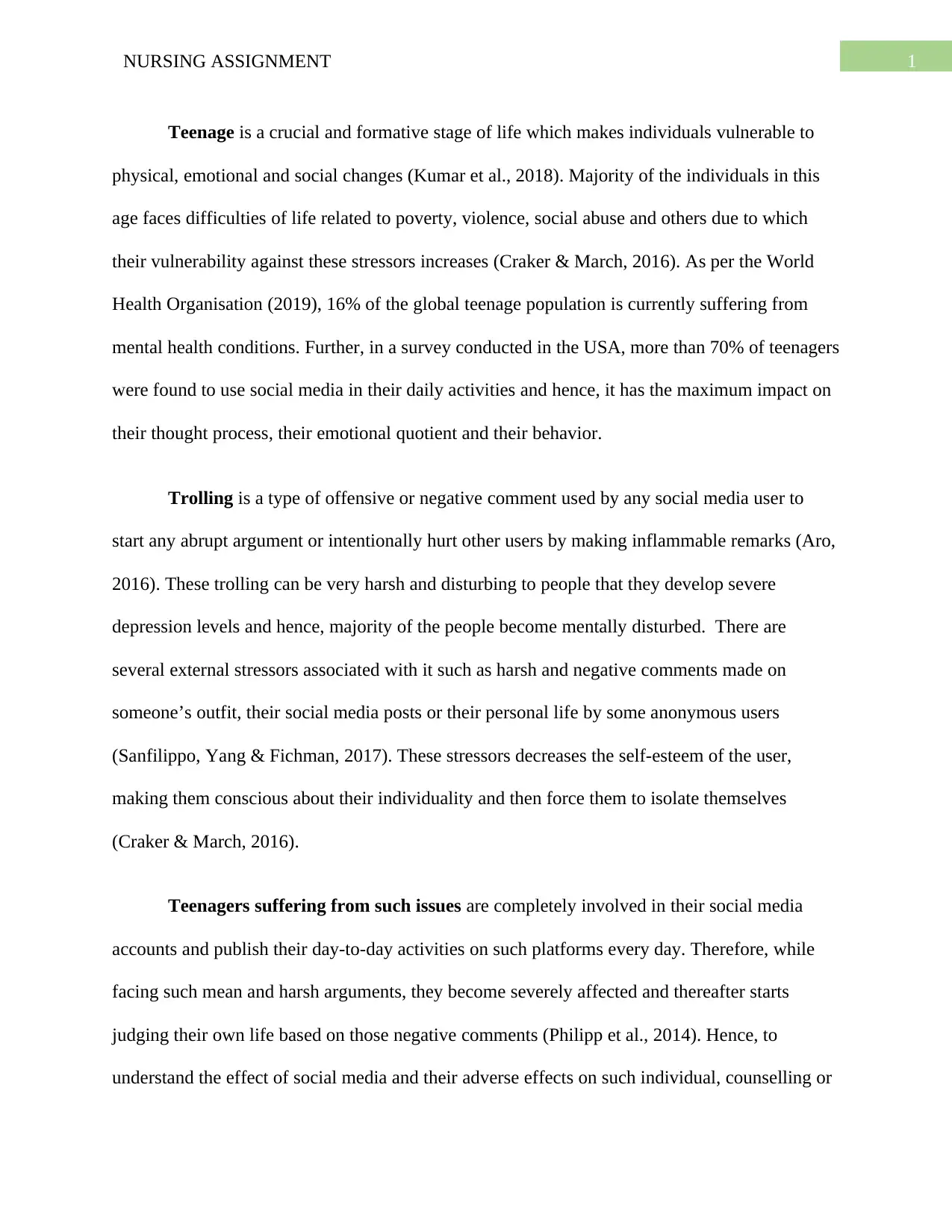
1NURSING ASSIGNMENT
Teenage is a crucial and formative stage of life which makes individuals vulnerable to
physical, emotional and social changes (Kumar et al., 2018). Majority of the individuals in this
age faces difficulties of life related to poverty, violence, social abuse and others due to which
their vulnerability against these stressors increases (Craker & March, 2016). As per the World
Health Organisation (2019), 16% of the global teenage population is currently suffering from
mental health conditions. Further, in a survey conducted in the USA, more than 70% of teenagers
were found to use social media in their daily activities and hence, it has the maximum impact on
their thought process, their emotional quotient and their behavior.
Trolling is a type of offensive or negative comment used by any social media user to
start any abrupt argument or intentionally hurt other users by making inflammable remarks (Aro,
2016). These trolling can be very harsh and disturbing to people that they develop severe
depression levels and hence, majority of the people become mentally disturbed. There are
several external stressors associated with it such as harsh and negative comments made on
someone’s outfit, their social media posts or their personal life by some anonymous users
(Sanfilippo, Yang & Fichman, 2017). These stressors decreases the self-esteem of the user,
making them conscious about their individuality and then force them to isolate themselves
(Craker & March, 2016).
Teenagers suffering from such issues are completely involved in their social media
accounts and publish their day-to-day activities on such platforms every day. Therefore, while
facing such mean and harsh arguments, they become severely affected and thereafter starts
judging their own life based on those negative comments (Philipp et al., 2014). Hence, to
understand the effect of social media and their adverse effects on such individual, counselling or
Teenage is a crucial and formative stage of life which makes individuals vulnerable to
physical, emotional and social changes (Kumar et al., 2018). Majority of the individuals in this
age faces difficulties of life related to poverty, violence, social abuse and others due to which
their vulnerability against these stressors increases (Craker & March, 2016). As per the World
Health Organisation (2019), 16% of the global teenage population is currently suffering from
mental health conditions. Further, in a survey conducted in the USA, more than 70% of teenagers
were found to use social media in their daily activities and hence, it has the maximum impact on
their thought process, their emotional quotient and their behavior.
Trolling is a type of offensive or negative comment used by any social media user to
start any abrupt argument or intentionally hurt other users by making inflammable remarks (Aro,
2016). These trolling can be very harsh and disturbing to people that they develop severe
depression levels and hence, majority of the people become mentally disturbed. There are
several external stressors associated with it such as harsh and negative comments made on
someone’s outfit, their social media posts or their personal life by some anonymous users
(Sanfilippo, Yang & Fichman, 2017). These stressors decreases the self-esteem of the user,
making them conscious about their individuality and then force them to isolate themselves
(Craker & March, 2016).
Teenagers suffering from such issues are completely involved in their social media
accounts and publish their day-to-day activities on such platforms every day. Therefore, while
facing such mean and harsh arguments, they become severely affected and thereafter starts
judging their own life based on those negative comments (Philipp et al., 2014). Hence, to
understand the effect of social media and their adverse effects on such individual, counselling or
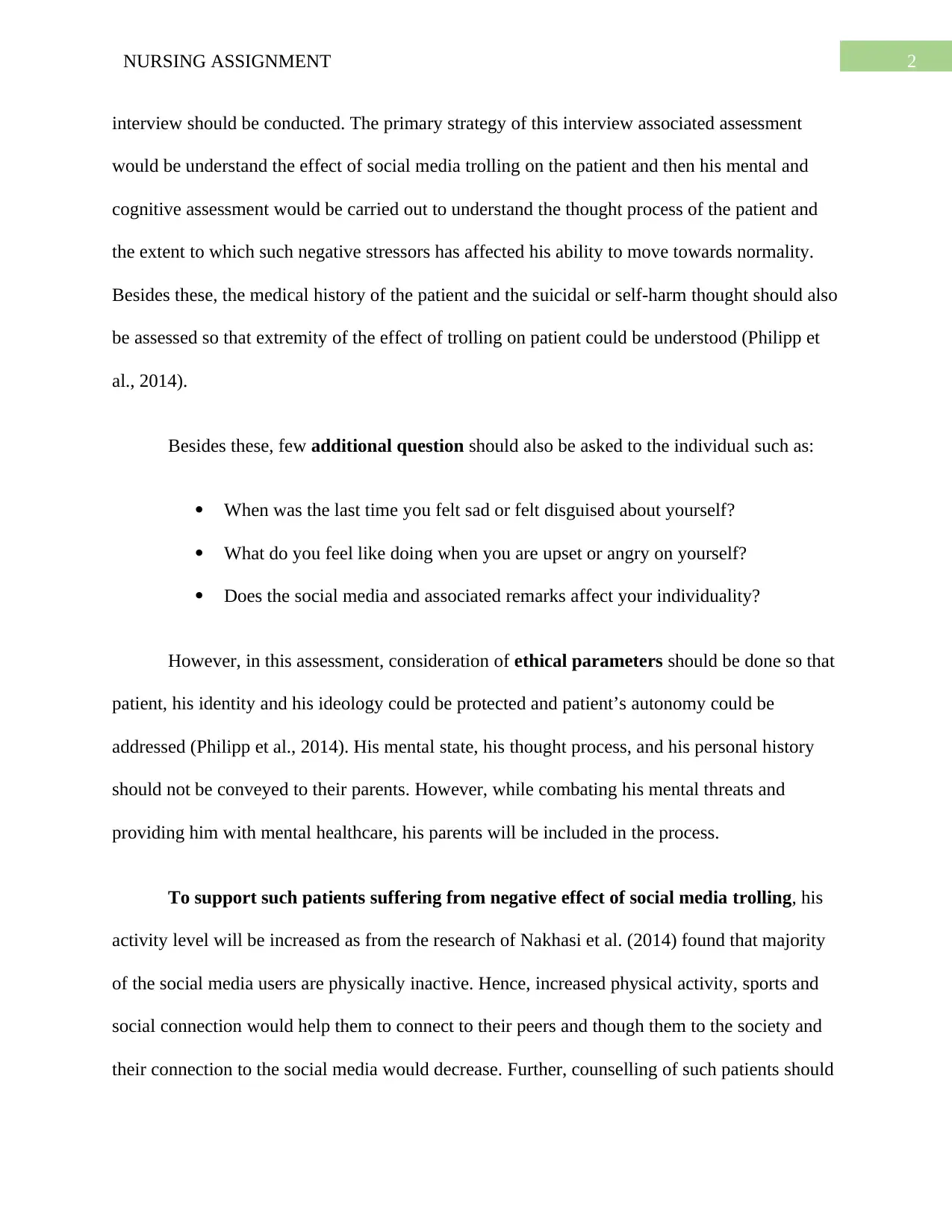
2NURSING ASSIGNMENT
interview should be conducted. The primary strategy of this interview associated assessment
would be understand the effect of social media trolling on the patient and then his mental and
cognitive assessment would be carried out to understand the thought process of the patient and
the extent to which such negative stressors has affected his ability to move towards normality.
Besides these, the medical history of the patient and the suicidal or self-harm thought should also
be assessed so that extremity of the effect of trolling on patient could be understood (Philipp et
al., 2014).
Besides these, few additional question should also be asked to the individual such as:
When was the last time you felt sad or felt disguised about yourself?
What do you feel like doing when you are upset or angry on yourself?
Does the social media and associated remarks affect your individuality?
However, in this assessment, consideration of ethical parameters should be done so that
patient, his identity and his ideology could be protected and patient’s autonomy could be
addressed (Philipp et al., 2014). His mental state, his thought process, and his personal history
should not be conveyed to their parents. However, while combating his mental threats and
providing him with mental healthcare, his parents will be included in the process.
To support such patients suffering from negative effect of social media trolling, his
activity level will be increased as from the research of Nakhasi et al. (2014) found that majority
of the social media users are physically inactive. Hence, increased physical activity, sports and
social connection would help them to connect to their peers and though them to the society and
their connection to the social media would decrease. Further, counselling of such patients should
interview should be conducted. The primary strategy of this interview associated assessment
would be understand the effect of social media trolling on the patient and then his mental and
cognitive assessment would be carried out to understand the thought process of the patient and
the extent to which such negative stressors has affected his ability to move towards normality.
Besides these, the medical history of the patient and the suicidal or self-harm thought should also
be assessed so that extremity of the effect of trolling on patient could be understood (Philipp et
al., 2014).
Besides these, few additional question should also be asked to the individual such as:
When was the last time you felt sad or felt disguised about yourself?
What do you feel like doing when you are upset or angry on yourself?
Does the social media and associated remarks affect your individuality?
However, in this assessment, consideration of ethical parameters should be done so that
patient, his identity and his ideology could be protected and patient’s autonomy could be
addressed (Philipp et al., 2014). His mental state, his thought process, and his personal history
should not be conveyed to their parents. However, while combating his mental threats and
providing him with mental healthcare, his parents will be included in the process.
To support such patients suffering from negative effect of social media trolling, his
activity level will be increased as from the research of Nakhasi et al. (2014) found that majority
of the social media users are physically inactive. Hence, increased physical activity, sports and
social connection would help them to connect to their peers and though them to the society and
their connection to the social media would decrease. Further, counselling of such patients should
⊘ This is a preview!⊘
Do you want full access?
Subscribe today to unlock all pages.

Trusted by 1+ million students worldwide
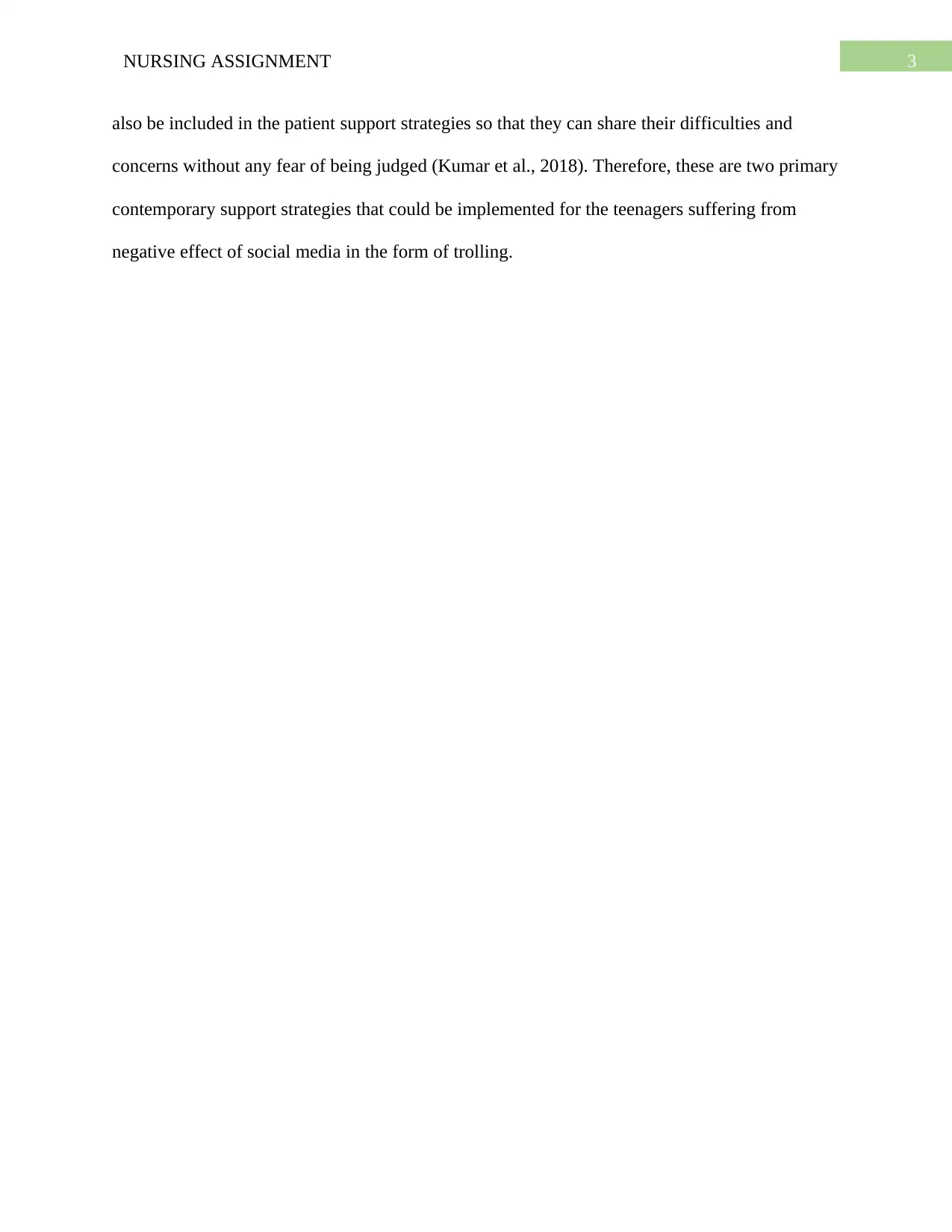
3NURSING ASSIGNMENT
also be included in the patient support strategies so that they can share their difficulties and
concerns without any fear of being judged (Kumar et al., 2018). Therefore, these are two primary
contemporary support strategies that could be implemented for the teenagers suffering from
negative effect of social media in the form of trolling.
also be included in the patient support strategies so that they can share their difficulties and
concerns without any fear of being judged (Kumar et al., 2018). Therefore, these are two primary
contemporary support strategies that could be implemented for the teenagers suffering from
negative effect of social media in the form of trolling.
Paraphrase This Document
Need a fresh take? Get an instant paraphrase of this document with our AI Paraphraser
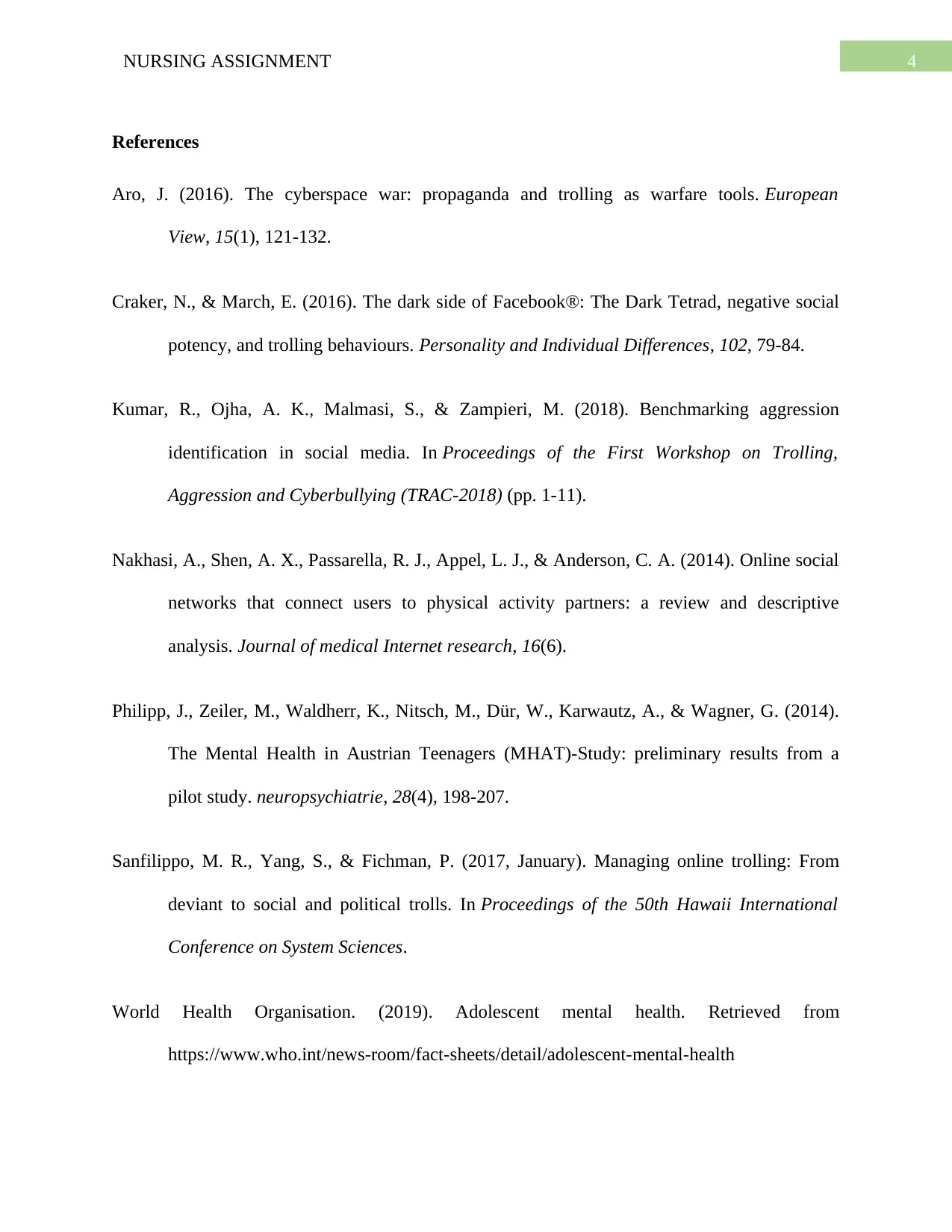
4NURSING ASSIGNMENT
References
Aro, J. (2016). The cyberspace war: propaganda and trolling as warfare tools. European
View, 15(1), 121-132.
Craker, N., & March, E. (2016). The dark side of Facebook®: The Dark Tetrad, negative social
potency, and trolling behaviours. Personality and Individual Differences, 102, 79-84.
Kumar, R., Ojha, A. K., Malmasi, S., & Zampieri, M. (2018). Benchmarking aggression
identification in social media. In Proceedings of the First Workshop on Trolling,
Aggression and Cyberbullying (TRAC-2018) (pp. 1-11).
Nakhasi, A., Shen, A. X., Passarella, R. J., Appel, L. J., & Anderson, C. A. (2014). Online social
networks that connect users to physical activity partners: a review and descriptive
analysis. Journal of medical Internet research, 16(6).
Philipp, J., Zeiler, M., Waldherr, K., Nitsch, M., Dür, W., Karwautz, A., & Wagner, G. (2014).
The Mental Health in Austrian Teenagers (MHAT)-Study: preliminary results from a
pilot study. neuropsychiatrie, 28(4), 198-207.
Sanfilippo, M. R., Yang, S., & Fichman, P. (2017, January). Managing online trolling: From
deviant to social and political trolls. In Proceedings of the 50th Hawaii International
Conference on System Sciences.
World Health Organisation. (2019). Adolescent mental health. Retrieved from
https://www.who.int/news-room/fact-sheets/detail/adolescent-mental-health
References
Aro, J. (2016). The cyberspace war: propaganda and trolling as warfare tools. European
View, 15(1), 121-132.
Craker, N., & March, E. (2016). The dark side of Facebook®: The Dark Tetrad, negative social
potency, and trolling behaviours. Personality and Individual Differences, 102, 79-84.
Kumar, R., Ojha, A. K., Malmasi, S., & Zampieri, M. (2018). Benchmarking aggression
identification in social media. In Proceedings of the First Workshop on Trolling,
Aggression and Cyberbullying (TRAC-2018) (pp. 1-11).
Nakhasi, A., Shen, A. X., Passarella, R. J., Appel, L. J., & Anderson, C. A. (2014). Online social
networks that connect users to physical activity partners: a review and descriptive
analysis. Journal of medical Internet research, 16(6).
Philipp, J., Zeiler, M., Waldherr, K., Nitsch, M., Dür, W., Karwautz, A., & Wagner, G. (2014).
The Mental Health in Austrian Teenagers (MHAT)-Study: preliminary results from a
pilot study. neuropsychiatrie, 28(4), 198-207.
Sanfilippo, M. R., Yang, S., & Fichman, P. (2017, January). Managing online trolling: From
deviant to social and political trolls. In Proceedings of the 50th Hawaii International
Conference on System Sciences.
World Health Organisation. (2019). Adolescent mental health. Retrieved from
https://www.who.int/news-room/fact-sheets/detail/adolescent-mental-health
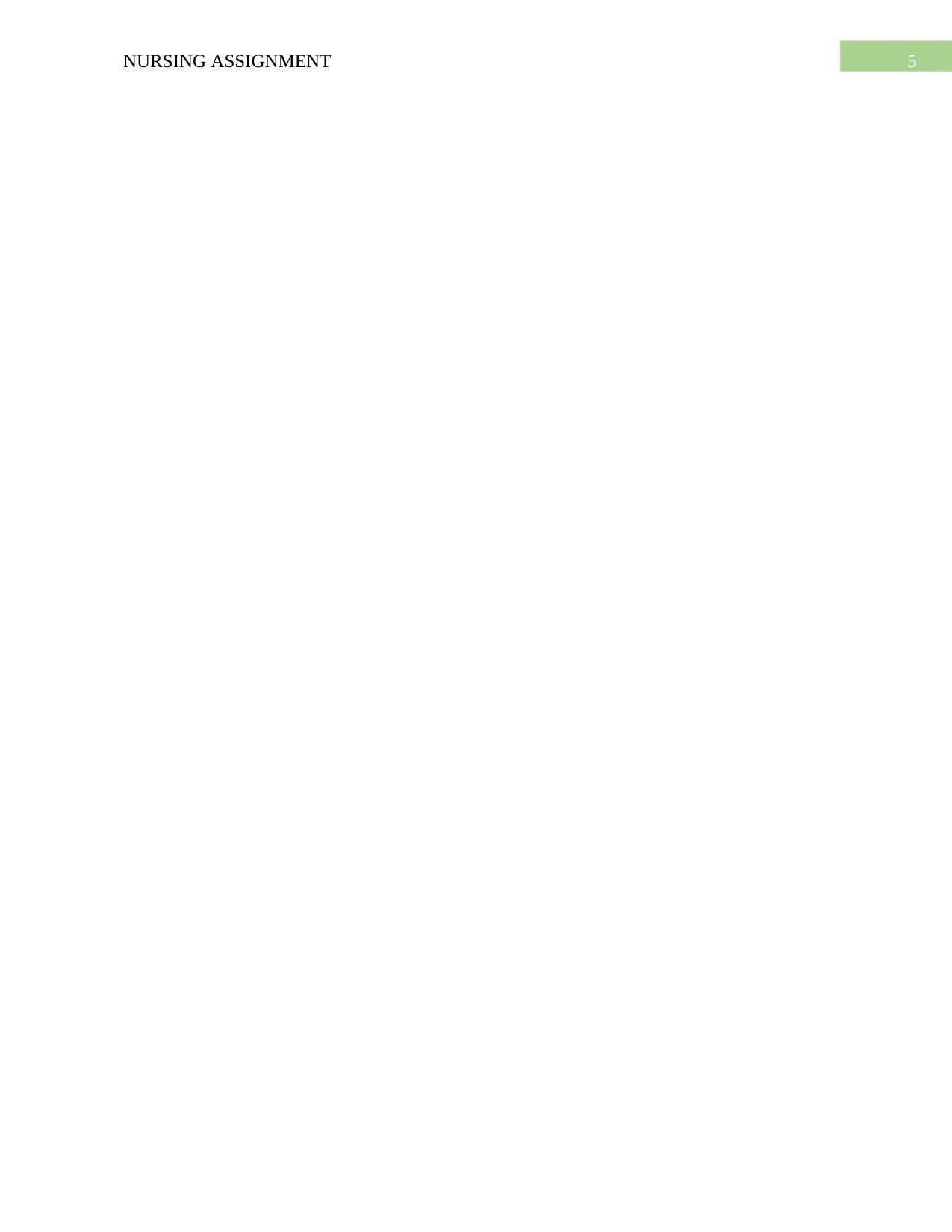
5NURSING ASSIGNMENT
⊘ This is a preview!⊘
Do you want full access?
Subscribe today to unlock all pages.

Trusted by 1+ million students worldwide
1 out of 6
Your All-in-One AI-Powered Toolkit for Academic Success.
+13062052269
info@desklib.com
Available 24*7 on WhatsApp / Email
![[object Object]](/_next/static/media/star-bottom.7253800d.svg)
Unlock your academic potential
Copyright © 2020–2026 A2Z Services. All Rights Reserved. Developed and managed by ZUCOL.
